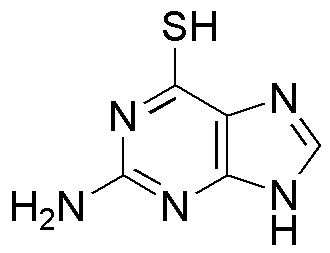|
6-Thioguanine is widely utilized in research focused on:
- Cancer Treatment: This compound is primarily used in chemotherapy for treating certain types of leukemia and other cancers, offering an alternative to traditional therapies.
- Immunosuppressive Therapy: It plays a crucial role in managing autoimmune diseases and preventing organ transplant rejection by suppressing the immune response.
- Genetic Research: Researchers use 6-Thioguanine to study genetic mutations and their effects on cellular processes, providing insights into disease mechanisms.
- Pharmaceutical Development: The compound is a key ingredient in developing new drugs, particularly for conditions that require targeted therapy, enhancing treatment efficacy.
- Biochemical Studies: It serves as a tool in various biochemical assays, helping scientists understand metabolic pathways and enzyme functions.
General Information
Properties
Safety and Regulations
Applications
6-Thioguanine is widely utilized in research focused on:
- Cancer Treatment: This compound is primarily used in chemotherapy for treating certain types of leukemia and other cancers, offering an alternative to traditional therapies.
- Immunosuppressive Therapy: It plays a crucial role in managing autoimmune diseases and preventing organ transplant rejection by suppressing the immune response.
- Genetic Research: Researchers use 6-Thioguanine to study genetic mutations and their effects on cellular processes, providing insights into disease mechanisms.
- Pharmaceutical Development: The compound is a key ingredient in developing new drugs, particularly for conditions that require targeted therapy, enhancing treatment efficacy.
- Biochemical Studies: It serves as a tool in various biochemical assays, helping scientists understand metabolic pathways and enzyme functions.
Documents
Safety Data Sheets (SDS)
The SDS provides comprehensive safety information on handling, storage, and disposal of the product.
Product Specification (PS)
The PS provides a comprehensive breakdown of the product’s properties, including chemical composition, physical state, purity, and storage requirements. It also details acceptable quality ranges and the product's intended applications.
Certificates of Analysis (COA)
Search for Certificates of Analysis (COA) by entering the products Lot Number. Lot and Batch Numbers can be found on a product’s label following the words ‘Lot’ or ‘Batch’.
Número de catálogo
Número de lote/lote
Certificates Of Origin (COO)
This COO confirms the country where the product was manufactured, and also details the materials and components used in it and whether it is derived from natural, synthetic, or other specific sources. This certificate may be required for customs, trade, and regulatory compliance.
Número de catálogo
Número de lote/lote
Safety Data Sheets (SDS)
The SDS provides comprehensive safety information on handling, storage, and disposal of the product.
DownloadProduct Specification (PS)
The PS provides a comprehensive breakdown of the product’s properties, including chemical composition, physical state, purity, and storage requirements. It also details acceptable quality ranges and the product's intended applications.
DownloadCertificates of Analysis (COA)
Search for Certificates of Analysis (COA) by entering the products Lot Number. Lot and Batch Numbers can be found on a product’s label following the words ‘Lot’ or ‘Batch’.
Número de catálogo
Número de lote/lote
Certificates Of Origin (COO)
This COO confirms the country where the product was manufactured, and also details the materials and components used in it and whether it is derived from natural, synthetic, or other specific sources. This certificate may be required for customs, trade, and regulatory compliance.


